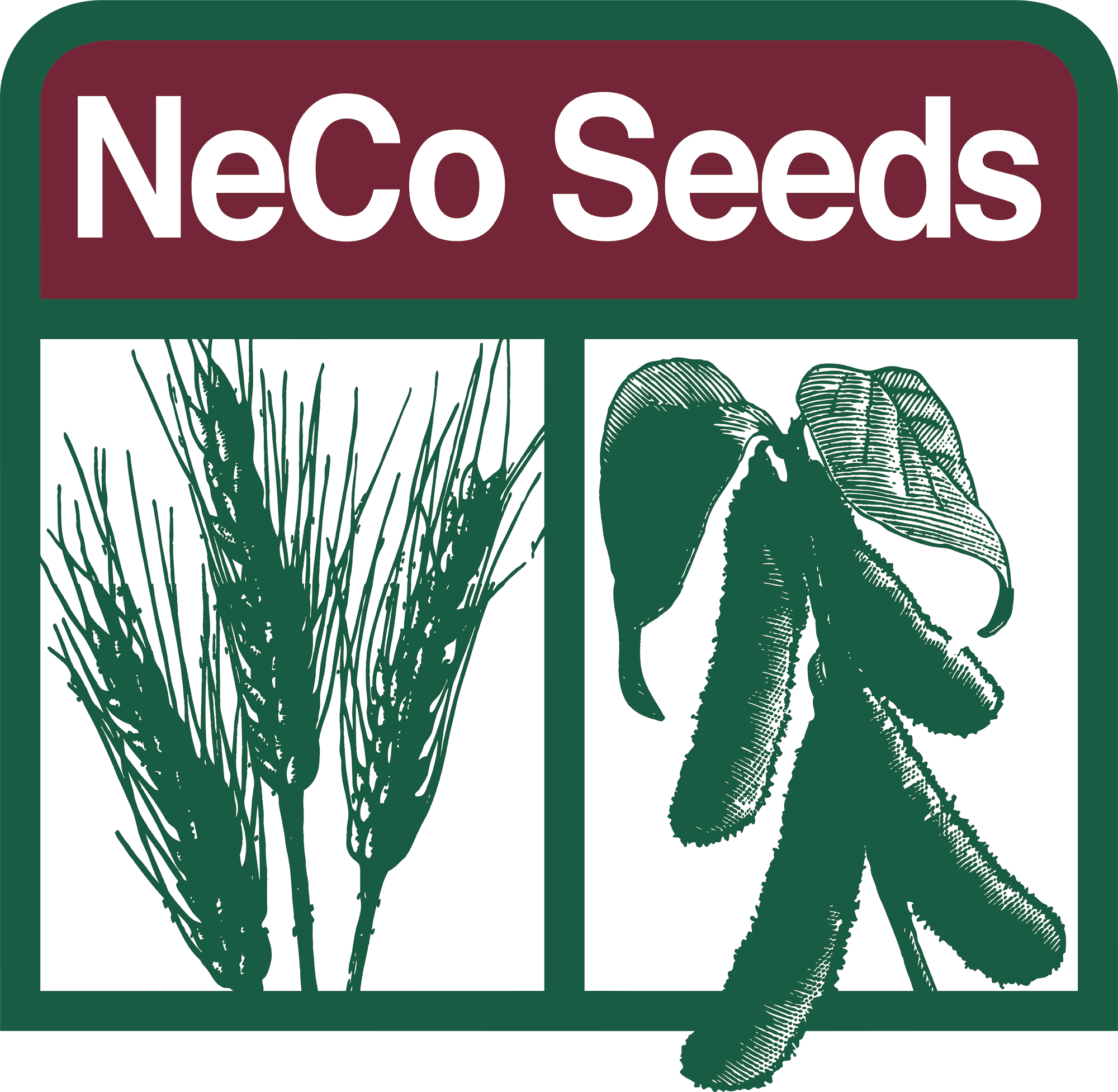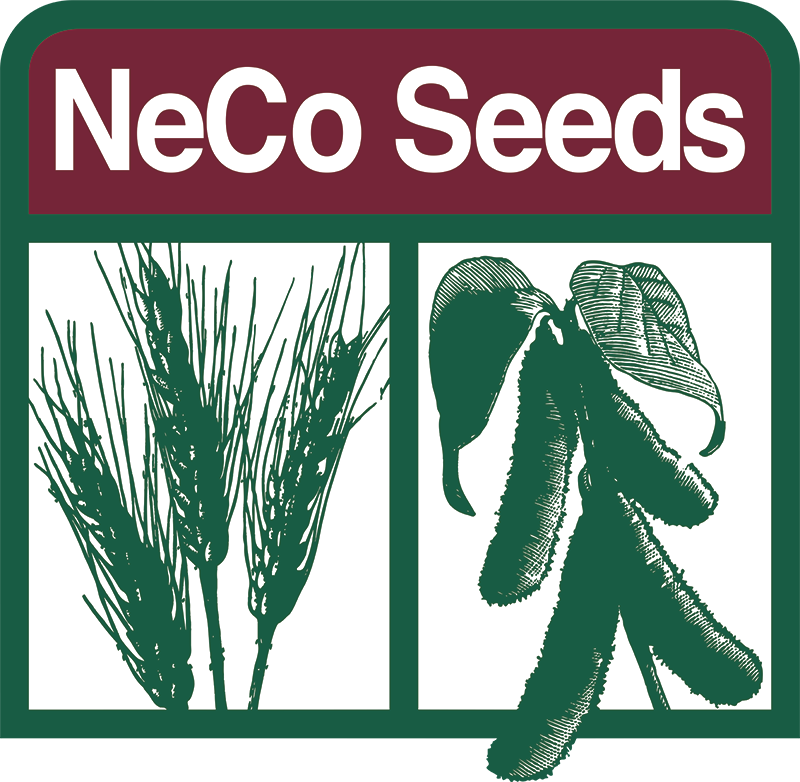Determine Customer's Need
- Product use
- What qualities of the product is best for the customer’s product:
- high protein
- high sugar
- high germination
- etc.
- Shipping method
- Delivery times
- Payment terms
- Pricing
- Quality Specifications
- Quantities
- Packaging Type
Seed Stock
- NeCo to provide producer with information concerning
- Origin of seed
- Quality
- purity
- germination rates
- Planting recommendations
- soils
- fertility levels
- depth
- special requirements
- planting date recommendation
- All seed stock to be used is GMO-Free seed stock, if customer requests.
- All GMO-Free seedstock will be conditioned seed grown under a quality assurance program.
- All seed will adhere to State seed purity laws.
- No bin-run seed is allowed.
- NeCo Seeds has a unique position … we have a breeding program that produces products that both the end users and farmers are able to use and grow.
Grower Agrees Contractually to Follow Terms
- Agronomic and Management Requirements
- Gives the right for inspections of fields, bins, and harvesting equipment
- IP production will not be grown on the same ground that had GMO soybeans on it the previous year
- Cannot replant crop until they notify the contractor
- Cannot have any volunteer corn in fields
- Will clean to the satisfaction of contractor, all equipment used in the planting, harvesting, transporting, and storing of IP crop.
- Will notify contractor as soon as harvest is complete and provide complete details as to the storage location and accurate estimates of the amount of bushels.
- Will obtain a composite bin sample as the IP product is being put into the storage bin – one sample per load.
- Minimum IP Field and Seed Quality Criteria
- Minimum seed field criteria include but are not limited to the following:
- No varietal mixture as determined by plant characteristics
- Minimal weathering, disease infections, or other factors adversely affecting seed quality
- No volunteer corn plants with kernels on the ears.
- Weed infestations at a low level that will permit harvest of soybean seed with minimum seed staining and weed seed cleanout
- Minimum harvested seed quality criteria:
- Minimum germination of 90% or as contract calls for
- Must be free of corn and black nightshade seed
- Must have moisture content between 11% and 14.5%
- Must be free of dirt and stain and shall not contain excessive broken or damaged soybeans. The condition of seed must be that, when cleaned and bagged, the final product has a high quality appearance.
- Minimum seed field criteria include but are not limited to the following:
Field/Grower Information
- Information to be received on/by each grower of GMO-Free products.
- Grower/Farm name and address.
- GMO-Free variety to be grown
- Number of acres
- Field number or Field name
- Previous crop on field
- Planting method
- depth
- row width
- Population planted
- Seed stock
- pounds per acre
- planting dates
- Soil type
- Fertilizer practices
- product and rates
- dates of application
- Herbicides
- prior years products and rates
- Soybean herbicides (this years)
- product and rates
- dates of application
- Insecticides
- product and rates
- dates of application
- Fungicides
- product and rates
- dates of application
- Inspection dates
- mapping
- bin inspections
- Harvest dates
- Moisture percentage at harvest
- Yield per acre
Planting
- All seed varieties are predetermined and has went through a quality assurance program.
- All fields are segregated.
- All planting equipment is cleaned.
- There are buffer strips around all fields.
- All fields are mapped.
- Previous crop is sometimes taken into consideration, depending on the crop being grown and customer’s needs.
Grower Inspections
- Field Inspections
- Inspector to receive variety description of the variety under inspections
- The variety description to include
- flower color
- pubescence color
- hilem color
- seed coat color
- pod color
- plant type (stick, moderate bush, bushy)
- Inspector walks field for offtypes
- checks for herbicide damage
- checks for weed infestation/counts
- checks for volunteer corn
- rejects or accepts according to contract specifications
- if rejected for offtypes the inspector knows it is not the same variety, not if the offtype variety is GMO or non-GMO.
- Storage and Equipment Inspections
- The combines are checked to see if free of GMO grain.
- If trucks are free of GMO grain.
- If augers are free of GMO grain.
- Asked when will harvest begin, approximately
- Check bins to see if free of GMO grain.
- floors
- side walls
- horizontal augers
- no spreaders allowed
Harvest and Bin Sample Testing
- Maximum 14.5% moisture
- Harvest in a timely manner and with least mechanical damage as possible.
- Store and handle in a manner approved by contractor with no seed mixture.
- Do not commingle field lots, either in on-farm bins or at conditioning facility.
- A bin sample is to be sent to SGS for quality and purity test.
- On-farm storage to be checked monthly to ensure IP product is being maintained properly.
Conditioning
- Cleaning the System
- All machinery purchased by the seed cleaner to clean the seed is seed conditioning machinery, thus is built for efficient and effective cleanups between seed varieties.
- All aspects of the conditioning system is cleaned. From the point the grain is received to the time it is bagged. Including the following:
- Pit
- Legs
- Bins
- Conveyors
- Cleaner
- under the cleaner
- gravities
- spirals
- holding tanks
- bagging area
- A non-GMO variety is processed before the respective contracted non-GMO variety is conditioned.
- Conditioning reports
- While conditioning a trace tare tests will be made within every two (2) hours checking the following quality criteria:
- weed seed count
- soil peds
- corn kernels
- nightshade berries
- seed coat splits
- A lot number assigned to track the seed from the time it’s planted until shipped. The lot number will track the following:
- Producer name
- Producer location
- Variety
- Field number
- Moisture of original field lot
- Bushels/units per field lot
- Total bushels packaged
- Total cleanout bushels
- Field lot bushels minus Packaged bushels
- Date quality sample sent to Crop Improvement Lab
- While conditioning a trace tare tests will be made within every two (2) hours checking the following quality criteria:
- Conditioned lots
- Once lots are conditioned and bagged a cleaned sample is sent to Crop Improvement to determine if lot made quality and purity standards.
- to be defined by both buyer and seller
- Keep sample of conditioned lot on premises at least 3 months after IP product is shipped.
- Once lots are conditioned and bagged a cleaned sample is sent to Crop Improvement to determine if lot made quality and purity standards.
Shipping
- Maximum 13.5% moisture
- Container shipments
- All containers must go through the following procedures:
- must be requested by the contractor to the container company to send food grade containers.
- All containers must be inspected for possible contaminates
- If contaminates are present the following must happen:
- sweep, air blow, and or water flushed or send back if the following doesn’t solve the possible contamination problem
- Must get the following information per container
- grower/processor/loading location
- license number off of container trailer
- IP product lot number
- destination
- shipping firm
- date loaded
- bill of lading number
manner and with least mechanical damage as possible.
- All containers must go through the following procedures:
- Store and handle in a manner approved by contractor with no seed mixture.
- Do not commingle field lots, either in on-farm bins or at conditioning facility.
- A bin sample is to be sent to SGS for quality and purity test.
- On-farm storage to be checked monthly to ensure IP product is being maintained properly.

